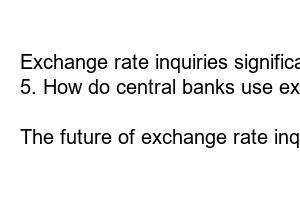과거 환율조회
Title: Unveiling the Mysteries of Past Exchange Rate Inquiries
Introduction:
In today’s globalized economy, exchange rates play a vital role in international transactions. But have you ever wondered how past exchange rate inquiries have shaped the financial landscape? Join us as we delve into the captivating world of historical exchange rates, unveiling their significance and impact on the global market.
1. Understanding the Importance of Exchange Rate Inquiries:
Exchange rate inquiries have been instrumental in assessing the value of one currency against another. These inquiries assist individuals, businesses, and governments in making informed decisions regarding trade, investments, and monetary policies.
2. The Evolution of Exchange Rate Inquiries:
From the ancient barter system to the advent of computerized trading, exchange rate inquiries have come a long way. Explore the fascinating journey of how inquiries transformed from simple market negotiations to complex algorithms, providing real-time rates and predictions.
3. Analyzing the Historical Trends:
By closely examining past exchange rate inquiries, economists can discern patterns and trends that shed light on the forces driving currency fluctuations. Historical data serves as a valuable tool for predicting future currency movements and understanding economic stability.
4. The Role of Technology in Exchange Rate Inquiries:
With the rise of technology, exchange rate inquiries have become more accessible and efficient than ever before. Online platforms and mobile applications enable individuals to track rates conveniently and react swiftly to market fluctuations, empowering us to make better financial decisions.
5. Influence on Global Trade and Investments:
Exchange rate inquiries heavily influence international trade and investments. A favorable exchange rate can boost exports for a country, making its products more competitive in the global market. Similarly, favorable exchange rates attract foreign investors, stimulating economic growth and job creation.
6. The Role of Exchange Rate Inquiries in Monetary Policies:
Central banks closely monitor exchange rates to formulate effective monetary policies. By managing interest rates, money supply, and exchange rate interventions, central banks aim to stabilize their currency, combat inflation, and support economic growth.
7. The Future of Exchange Rate Inquiries:
As we tread into the future, technological advancements like blockchain and artificial intelligence hold immense potential to revolutionize exchange rate inquiries. These innovations could streamline transactions, enhance transparency, and provide even more accurate forecasts.
Summary:
In this insightful blog post, we explored the significance of past exchange rate inquiries and their impact on the global economy. By understanding the importance of these inquiries, analyzing historical trends, acknowledging the role of technology, and recognizing their influence on global trade and monetary policies, we gain a holistic view of the intricate world of exchange rates. As we look ahead, we anticipate further advancements in exchange rate inquiries that will shape the financial landscape, bringing us closer to a more interconnected and efficient global market.
FAQs:
1. What is an exchange rate inquiry?
Exchange rate inquiries involve assessing the value of one currency against another to facilitate trade, investments, and monetary policies.
2. How do historical exchange rate inquiries help in predicting currency movements?
Analyzing historical trends allows economists to identify patterns, enabling predictions of future currency fluctuations.
3. How can technology assist in exchange rate inquiries?
Technological advancements provide online platforms and mobile applications that assist individuals in monitoring exchange rates conveniently and reacting swiftly to market fluctuations.
4. Can exchange rate inquiries impact global trade?
Exchange rate inquiries significantly influence international trade by affecting a country’s export competitiveness.
5. How do central banks use exchange rate inquiries?
Central banks closely monitor exchange rates to formulate effective monetary policies, aiming to stabilize currency, combat inflation, and support economic growth.
6. What does the future hold for exchange rate inquiries?
The future of exchange rate inquiries lies in the potential of innovations like blockchain and artificial intelligence to streamline transactions and provide even more accurate forecasts.

